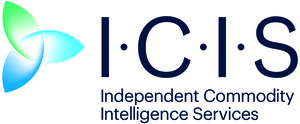Easy Times are Over, Says ICIS, as Carbon Prices Enter Bullish Corridor
KARLSRUHE, Germany, August 21, 2014 /PRNewswire/ --
Tough times ahead for industrials with ETS compliance obligations, as reduced auction volumes and back-loading mean carbon prices set for sustained increase, reaching double digits by 2015
With prices hitting a 5 month high of €6.50 today, established energy intelligence provider ICIS Tschach predicts a sustained increase in the price of European Trading Scheme (ETS) allowances. On current trajectories, prices are expected to hit double digits and a two-year high by year's end. Such an increase would be a worrying trend for those with significant compliance obligations, especially large, carbon-intensive industrials.
Since the beginning of the EU ETS's Phase 3 compliance period at the start of 2013, the market has been oversupplied with allowances, leading to a sustained period of trading within a €3-6 corridor. Now however, a number of factors are converging to push prices consistently higher.
"After all the volatility and exceptional trading activity in Q1 2014, we are seeing the effects of back-loading really start to take hold now" said Philipp Ruf, Lead Analyst, EU Carbon Markets at ICIS. "Next to the reduced auction volume, the appetite of industrials to sell banked length is rather muted while the demand from utilities seems constant. All these factors, together with the potential momentum derived from the policy discussion around the 2030 emission reduction target and the Market Stability Reserve, suggest a sustained bullish corridor for carbon prices."
Higher carbon prices represent a business risk to all sectors where there is an emissions compliance requirement. However, the biggest effect is likely to be felt in the carbon-heavy industrial sector.
"Up to now, industrials have enjoyed a huge number of free allowances under the scheme and could easily cover their obligations and maybe even sell some allowances at a profit," notes Jan Frommeyer, Director of Market Analysis at ICIS. "Now the free allowances are scarcer, and most carbon-heavy industrials will face a shortage of allowances in the near future. That's not so risky with prices as low as they have been, but as they edge higher it becomes more and more of a problem."
ICIS predicts that carbon prices will enter double digits by the start of 2015 for the first time since 2012. However, with further planned political interventions designed to keep prices high, prices of above €20 are perfectly feasible in the third trading period. Such a scenario would represent a significant risk to large industrials and an intelligent and informed hedging strategy will be vital to protect profits.
"It's not all about the risks though," adds Frommeyer. "For those that proactively manage their exposure now there's a real opportunity to gain a competitive advantage over rivals with less effective hedging strategies."
Notes to editors:
About EU ETS
Launched in 2005, the EU's Emissions Trading Scheme is the cornerstone of the EU's policy to combat climate change.
Large carbon emitters are required to surrender an allowance for each tonne of CO2 emitted. A certain number of free allowances is awarded to each participant and more are released at auction. Allowances may then be traded as required.
The EU ETS was from the start designed as a multi-national - with all EU member states participating in the system - as well as a multi-sector system. In 2013 more than 11,000 stationary installations in 31 countries participated in the scheme. Covered by the EU ETS are carbon dioxide (CO2) emissions from power and heat generation, energy-intensive industry production and commercial airlines as well as nitrous oxide (N2O) and per-fluorocarbons (PFCs).
The system covers around 2bn tonnes of carbon emissions (around 45% of the EU's greenhouse gas emissions in 2013) and the average price for a European Union Allowance (EUA) was €4.50 in 2013.
About ICIS
ICIS Tschach Solutions provides information and intelligence to every participant in the carbon markets. ICIS Tschach Solutions employs a unique combination of quantitative and qualitative research and expert opinion to deliver detailed insight into emissions and carbon trading schemes, and identifies important commonalities and disparities. Our Timing Impact Model provides clients with a more rounded perspective than conventional approaches and helps create competitive advantage. We offer clients a complete and transparent analysis of market dynamics, including emerging upside or downside risks to carbon prices and the assumptions on which these are based.
ICIS has more than 30 years' experience providing pricing information, news, analysis and consultancy to buyers, sellers and analysts of energy and related commodities. In 2013 it acquired Tschach Solutions to add specialist carbon trading services to its portfolio. ICIS Tschach Solutions is based in Karlsruhe.
About Reed Business Information
At Reed Business Information we provide information and online data services to business professionals worldwide. Customers have access to our high-value industry data, analytics, information and tools. Our strong global brands hold market-leading positions across a wide range of industry sectors including banking, petrochemicals and aviation where we help customers make key strategic decisions every day. RBI is part of Reed Elsevier, a leading global provider of data, information and solutions for professional customers.
About Reed Elsevier
Reed Elsevier is a world leading provider of information solutions for professionals. We help scientists make new discoveries, lawyers win cases, doctors save lives, corporations build commercial relationships, insurance companies assess risk, and government and financial institutions detect fraud.
Media contact:
Jacqueline Savory
Senior Marketing Manager
Email: jacqueline.savory@icis.com
Direct: +44-(0)208-652-4490
Mobile: +44-(0)7825-680550






Share this article